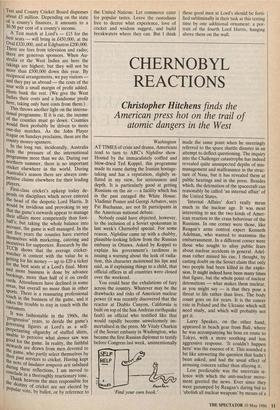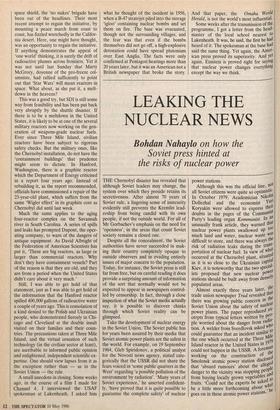CHERNOBYL REACTIONS
Christopher Hitchens finds the
American press hot on the trail of atomic dangers in the West
Washington AT TIMES of crisis and drama, Americans tend to turn to ABC's Nightline show. Hosted by the immaculately coiffed and blow-dried Ted Koppel, this programme made its name during the Iranian hostage- taking and has a reputation, slightly in- flated in my view, for seriousness and depth. It is particularly good at getting Russians on the air — a facility which has in the past enraged the White House. Vladimir Posner and Georgi Arbatov, says Pat Buchanan, are not fit participants in the American national debate.
Nobody could have objected, however, to the inclusion of a Soviet spokesman in last week's Chernobyl special. For some reason, Nighdine came up with a chubby, plausible-looking fellow from the Russian embassy in Ottawa. Asked by Koppel to explain his government's tardiness in issuing a warning about the leak of radia- tion, this character moistened his lips and said, as if explaining things to a child, that official offices in all countries were closed over the weekend.
You could hear the exhalations of fury across the country. Whatever may be the drawbacks and risks of American nuclear power (it was recently discovered that the reactor at Diablo Canyon, California is built on top of the San Andreas earthquake fault) an official who testified like that would rapidly become unwelcomely im- mortalised in the press. Mr Vitaly Churkin of the Soviet embassy in Washington, who became the first Russian diplomat to testify before Congress last week, unintentionally 'Find your own book.' made the same point when he sneeringly referred to the space shuttle disaster in an attempt to deflect questioning. The inquiry into the Challenger catastrophe has indeed revealed quite unsuspected depths of mis- management and malfeasance in the struc- ture of Nasa, but it has revealed them at public hearings and in the press. Besides which, the detonation of the spacecraft can reasonably be called 'an internal affair' of the United States.
'Internal Affairs' don't really mean much in the nuclear age. It was most interesting to see the two kinds of Amer- ican reaction to the crass behaviour of the Russians. In one corner were those, like Reagan's arms control expert Kenneth Adelman, who wanted to maximise the embarrassment. In a different corner were those who sought to allay public fears about nuclear accidents in general. Adel- man rather missed his cue, I thought, by casting doubt on the Soviet claim that only two people had been killed in the explo- sion. It might indeed have been many times that figure, but the whole point of nuclear detonations — what makes them nuclear, as you might say — is that they pose a threat to life rather than lives. The body count goes on for years. It is the cancer rate in Poland and the Ukraine which will need study, and which will probably not get it.
Larry Speakes, on the other hand, appeared in beach gear from Bali, where he was accompanying his boss en route to Tokyo, with a more soothing and less aggressive response. 'It couldn't happen here' was the essence of it. This sounded a bit like answering the question that hadn't been asked, and had the usual effect of arousing concern rather than allaying it.
Less predictable was the uncertain si- lence with which the anti-nuclear move- ment greeted the news. Ever since they were gazumped by Reagan's daring bid to 'abolish all nuclear weapons' by means of a space shield, the 'no nukes' brigade have been out of the headlines. Their most recent attempt to regain the initiative, by mounting a peace march from coast to coast, has fizzled wretchedly in the Califor- nia desert. Here, one might have thought, was an opportunity to regain the initiative. If anything demonstrates the appeal of 'one world' thinking, it is surely the drift of radioactive plumes across frontiers. Yet it was not until last Sunday that Marty McGrory, doyenne of the pro-freeze col- umnists, had rallied sufficiently to point out that 'Star Wars' will mean reactors in space. What about, as she put it, a melt- down in the heavens?
This was a good try, but SDI is still some way from feasibility and has been put back very abruptly by the shuttle disaster. If there is to be a meltdown in the United States, it is likely to be at one of the several military reactors now working on the gen- eration of weapons-grade nuclear fuels. Ever since Three Mile Island, civilian reactors have been subject to rigorous safety checks. But the military ones, like the Chernobyl installation, do not have the 'containment buildings' that prudence might seem to dictate. In Hanford, Washington, there is a graphite reactor which the Department of Energy criticised in a report four years ago. Instead of rebuilding it, as the report recommended, officials have commissioned a repair of the 23-year-old plant, which suffers from the same `Wigler effect' in its graphite core as Chernobyl did until last week.
Much the same applies to the aging four-reactor complex on the Savannah river in South Carolina. A series of spills and leaks has prompted Dupont, the oper- ating company, to warn of the dangers of antique equipment. As David Albright of the Federation of American Scientists has put it, 'These are big reactors, as large or larger than commercial reactors. Why don't they have containment vessels? Part of the reason is that they are old, and they are from a period when the United States didn't care about it very much.'
Still, I was able to get hold of that statement, just as I was able to get hold of the information that the Hanford reactor spilled 400,000 gallons of radioactive water a couple of years ago. This is consolation of a kind denied to the Polish and Ukrainian people, who demonstrated fiercely in Chi- cago and Cleveland at the double insult visited on their families and their coun- tries. The precautions taken at Three Mile Island, and the virtual cessation of such technology (in the civilian sector at least), are ascribable to informed public opinion and enlightened, independent scientific ex- pertise. One should view lapses from it as the exception rather than — as in the Soviet Union — the rule.
A small anecdote in closing. Some weeks ago, in the course of a film I made for Channel 4, I interviewed the USAF spokesman at Lakenheath. I asked him what he thought of the incident in 1956, when a B-47 stratojet piled into the storage 'igloo' containing nuclear bombs and set them on fire. The base was evacuated, though not the surrounding villages, and the fear was that even if the bombs themselves did not go off, a high-explosive detonation could have spread plutonium over East Anglia. The facts were only confirmed at Pentagon hearings more than 20 years later, but it was an American not a British newspaper that broke the story. And that paper, the Omaha World Herald, is not the world's most influential.
Some weeks after the transmission of the programme, I got a letter from the head- master of the local school nearest to Lakenheath. It was, he said, the first he had heard of it. The spokesman at the base had said the same thing. Yet again, the Amer- ican press proved its superiority. And yet again, Einstein is proved night for saying that nuclear power changes everything except the way we think.



























































 Previous page
Previous page